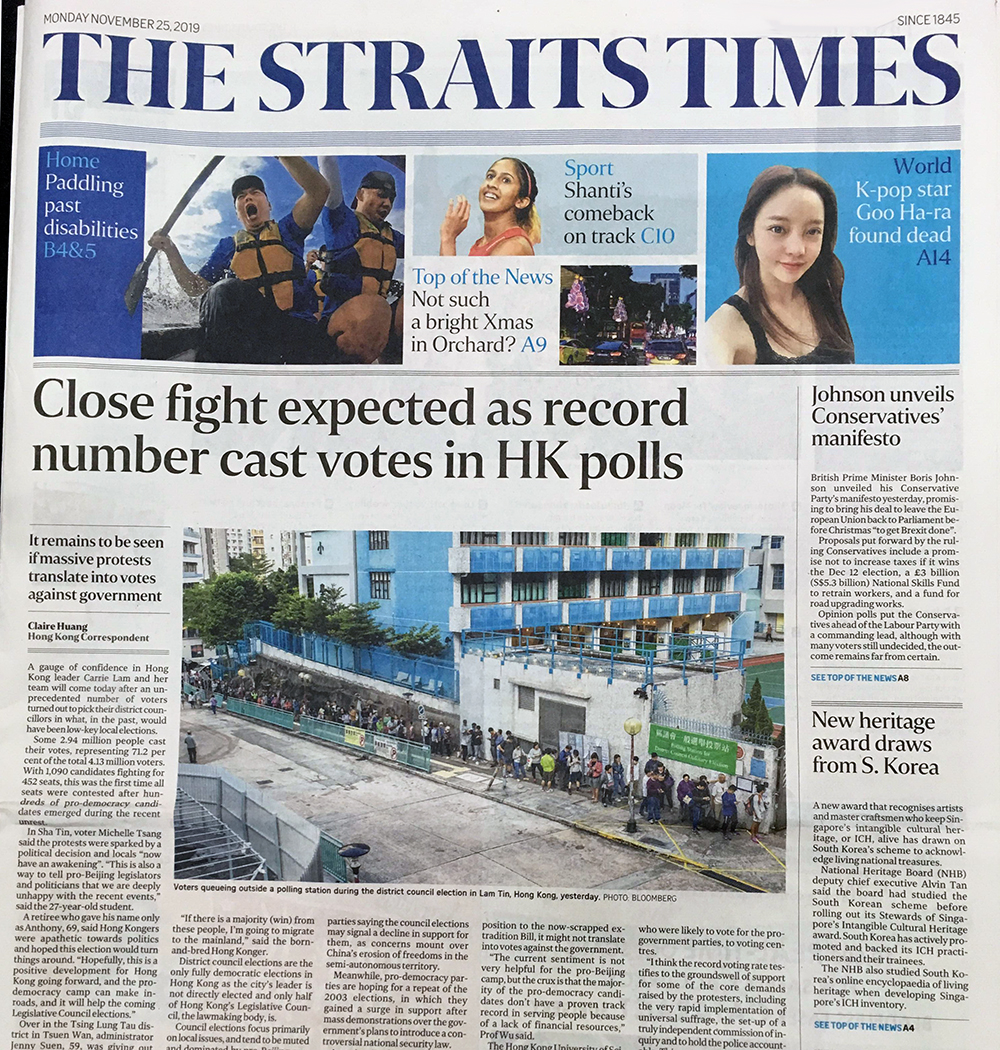The Nov. 25, 2019 headline on the front page of The Straits Times screamed: "Close fight expected as record number cast votes in HK polls".

It turned out to be a bloodbath.
The ST story was very likely written and went to print before voting results in Hong Kong were tallied.
It soon became clear after 2.30am on Monday that the Sunday local district council elections in Hong Kong was a massacre of pro-Beijing candidates.
Quote that did not age well overnight
Jenny Suen, 59, a born-and-bred Hongkonger, quoted by ST, said in the piece: "These elections are like a battle of the generations, between the older folks and the youth."
She said pro-democracy folks' views are "shallow and short-sighted".
"If there is a majority (win) from these people, I'm going to migrate to the mainland."
Okay boomer.
Time to pack up.
Another quote that did not age well overnight
Associate Profesor Alfred Wu of the Lee Kuan Yew School of Public Policy told ST that he expected a tough fight between the pro-democracy and pro-Beijing camps.
Even though two million took to the streets in June to voice their opposition to the now-scrapped extradition bill, it might not translate into votes against the government.
"The current sentiment is not very helpful for the pro-Beijing camp, but the crux is that the majority of the pro-democracy candidates don't have a proven track record in serving people because of a lack of financial reseources," Wu said.
Wu was a senior journalist in mainland China from 2000 to 2007, his LKYSPP profile said.
He received over a dozen awards and honours for outstanding journalism both from Chinese and overseas organisations.
Quote that aged well overnight
The Hong Kong University of Science and Technology's Associate Professor Sing Ming was more optimistic about the pro-democracy camps' chances.
Sing told ST: "I think the record voting rate testifies to the groundswell of support for some of the core demands raised by the protesters, including the very rapid implementation of universal suffrage, the set-up of a truly independent commission of inquiry and to hold the police accountable. The message is very clear."
Stats from the bloodbath
Some 2.94 million people cast their votes -- 71.2 percent of the total 4.13 million voters.
A total of 1,090 candidates fought for 452 seats.
It was the first time all seats were contested.
The democrats won majorities in at least 17 of the 18 district councils -- wresting control of them from pro-Beijing candidates.
Their pro-Beijing rivals lost more than 250 seats from 2015.
Voting in Hong Kong is not compulsory.
A surge in voters is a sign something is brewing.
At least one district in the last election saw just 49 percent turnout -- which was considered high then.
The low-key local election turned into a referendum on the city’s protests, as well as the government’s response.
Local issues include dealing with noise pollution.
An unprecedented number of voters eventually turned out to pick their district councillors.
District council elections are the only fully democratic elections in Hong Kong.
The pro-Beijing candidates ended up getting pushed out in favour of pro-democracy candidates.
The city's leader, who is currently Chief Executive Carrie Lam, is not directly elected.
Only half of Hong Kong's Legislative Council, the lawmaking body, is directly elected.
Council elections focus primarily on local issues and tend to be muted and dominated by pro-Beijing parties.
District councillors are give 117 seats on the 1,200-member Election Committee that selects the city's chief executive.
Top right photo via Getty
If you like what you read, follow us on Facebook, Instagram, Twitter and Telegram to get the latest updates.
